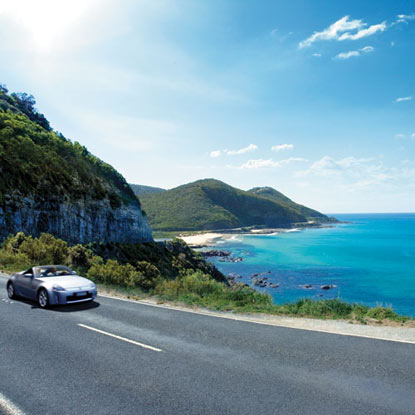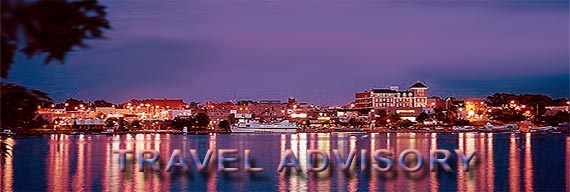Take a ride through nature on the
spectacular Great Ocean Road
Stretching from Geelong to Portland in
south-western Victoria, the
Great Ocean Road is characterised by exquisite coastal scenery,
mountains and farmland, thriving country towns, rainforests and
historic relics.
From the air, it looks like a giant serpent,
spiralling through deep
green forests and snaking its way along huge seaside cliffs. The spirit
of the traditional owners of this land, the Gunditjmara people, defines
the essence of this landscape. To travel its length is an inspiring and
invigorating experience: at the end of the journey you’ll be in no
doubt why the Great Ocean Road is classified as one of Australia's
National Landscapes.

Blood sweat and tears are a part of the
history of this much loved
Australian journey. Early motorists risked life and limb on the Great
Ocean Road because many cars at that time weren’t suitable for the
drive and were swapped for horses or horse-drawn carriages. Work on the
road began in 1919, when soldiers returning from WW1 used picks,
crowbars and shovels to hew the road from solid rock. Their 13-year
achievement became a memorial to those lost in the war.
The road begins in the seaside town of
Torquay, Australia’s surfing
capital and home of Aussie surfing culture. The perfect swells at Bells
Beach draw surfers from around the world and the town is home to
the
world’s largest surf museum.
The next major town is Anglesea. Its golf
course is home to hundreds
of wild kangaroos and wallabies who graze on the fairways, oblivious to
the little white balls falling around them. The 1891 Split Point
Lighthouse at Aireys Inlet, affectionately known as the White Queen,
has been a welcome sight for ships that have rounded Cape Otway for
more than a century. All along the Great Ocean Road the coastline is
dotted with lighthouses, visible reminders of why this stretch is also
given the moniker of Australia’s Shipwreck Coast.
The town of Lorne enjoys a lively
café culture and wonderful views.
People lucky enough to live at Lorne enjoy stunning vistas out across
the Pacific Ocean, a fact that did not go unnoticed by the Victorian
Government in the late 1800s who declared Lorne a place of natural
beauty and special significance, the first in Australia to be
named
such.
A great place to enjoy Lorne’s magnificent
views is from the rooftop
beer garden at the Lorne Hotel. Teddy’s Lookout also provides
spectacular cliff top views of the Great Ocean Road as it snakes along
the coastline and into the rich rainforest of the Angahook-Lorne
National Park.
Between Lorne and Apollo Bay the Great Ocean
Road follows the base
of the cliffs. Ocean foam almost splashes your car fender, and soaring
forests of manna gums and mountain ash erupt from an understorey of
tree ferns that surround them like lacy green petticoats. Apollo Bay is
the gateway to the Otway National Park, home for an oasis of fern
gullies, giant rainforest trees and abundant wildlife.
You could keep driving on the Great Ocean
Road, but by far the best
way to get to the heart of this region’s natural beauty is to walk.
There are more than 100 kilometres of tracks within the park, many
following old tramways that were built when the forest was logged.
Others were built in the late 1800s, making them some of the oldest
tourism developments in Victoria. Wallabies, koalas and echidnas
frequent these ranges and you may be lucky enough to spot an elusive
platypus in a forest stream. In winter, rain-swollen streams create
spectacular cascading waterfalls. Stop by the Great Ocean Road Visitors
Information Centre for information on where to eat and stay in the
region.
Great Ocean Road: The Twelve Apostles
- An unforgettable highlight of the
Australian Great Ocean Road is the rock formations known as the Twelve
Apostles.
|













